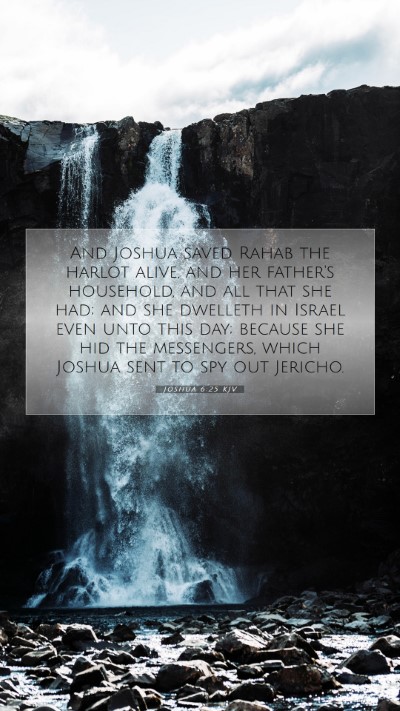Bible Verse Meaning: Joshua 6:25
Verse Reference: Joshua 6:25 states, "But Joshua spared Rahab the harlot, and her father's household, and all that she had; and she dwelleth in Israel even unto this day; because she hid the messengers, which Joshua sent to spy out Jericho."
Summary of Biblical Exegesis
In this pivotal verse, we see the culmination of Rahab's faithfulness and the mercy of God manifested through the actions of Joshua. Scholars like Matthew Henry, Albert Barnes, and Adam Clarke provide insight into the significance of this event, emphasizing themes of redemption, God's grace, and the consequences of faith.
Commentary Insights
-
Matthew Henry remarks on the nature of God's grace, noting that Rahab, a woman of ill repute, was chosen as an instrument of faith and protection. Her actions in hiding the spies were pivotal, demonstrating the power of belief over background or past sins. Henry emphasizes that Rahab's inclusion in the people of Israel stands as a testament to God's mercy towards those who show faith.
-
Albert Barnes provides a historical context, explaining that Rahab's decision to protect the Israelite spies was a significant act that highlighted her recognition of God's sovereignty. Barnes suggests that her actions were not merely for convening safety, but a profound acknowledgment of the God of Israel, identifying the blessings that come from faithfulness to God’s plan.
-
Adam Clarke discusses the implications of Rahab's salvation, highlighting her role in biblical history as part of the lineage of Christ. Clarke notes that this verse reflects how God can redeem anyone who believes and acts in faith. He also points out that the protection of Rahab and her family serves as a powerful illustration of God's favor resting on those who honor Him.
Understanding Scripture
This verse serves multiple purposes in the narrative of Joshua and the broader theological landscape. It illustrates the principles of justice and mercy and stands as an assurance that God's promise extends beyond physical lineage to those who embrace Him by faith.
Theological Themes
-
Redemption: Rahab’s story exemplifies how God redeems those who step out in faith, exemplifying the transformative power of belief.
-
Grace: The decision to spare Rahab reinforces the notion that God's grace is available to all, irrespective of their past.
-
Faith in Action: Her proactive steps in hiding the spies underline that true faith is demonstrated in action, not just belief.
-
Divine Sovereignty: It shows that God is ultimately in control of the nations and peoples, and He can use anyone to fulfill His purposes.
Bible Study Insights
For those engaged in Bible study groups or seeking Bible study resources, understanding Joshua 6:25 offers rich analysis points regarding faith and redemption. It can also be useful in online Bible study settings to discuss how God’s mercy reaches beyond cultural boundaries and human limitations.
Application of Joshua 6:25
When applying this verse to daily life, consider how faith can lead to personal transformation and how God can work through even the most unlikely people. It challenges believers to reflect on their own lives and the faith they exhibit in their actions.
Cross References
- Hebrews 11:31 – Highlights Rahab’s faith and inclusion in the “Hall of Faith.”
- Matthew 1:5 – Mentions Rahab in the genealogy of Jesus.
- James 2:25 – Affirms Rahab's actions as righteous, promoting the idea of faith expressed through works.
Conclusion
Joshua 6:25 is a profound verse that encapsulates major themes in Christian doctrine—faith, grace, and redemption. It invites reflection on how one’s past does not dictate their potential for greatness in God’s plan, evoking both historical and personal relevance for modern believers.


